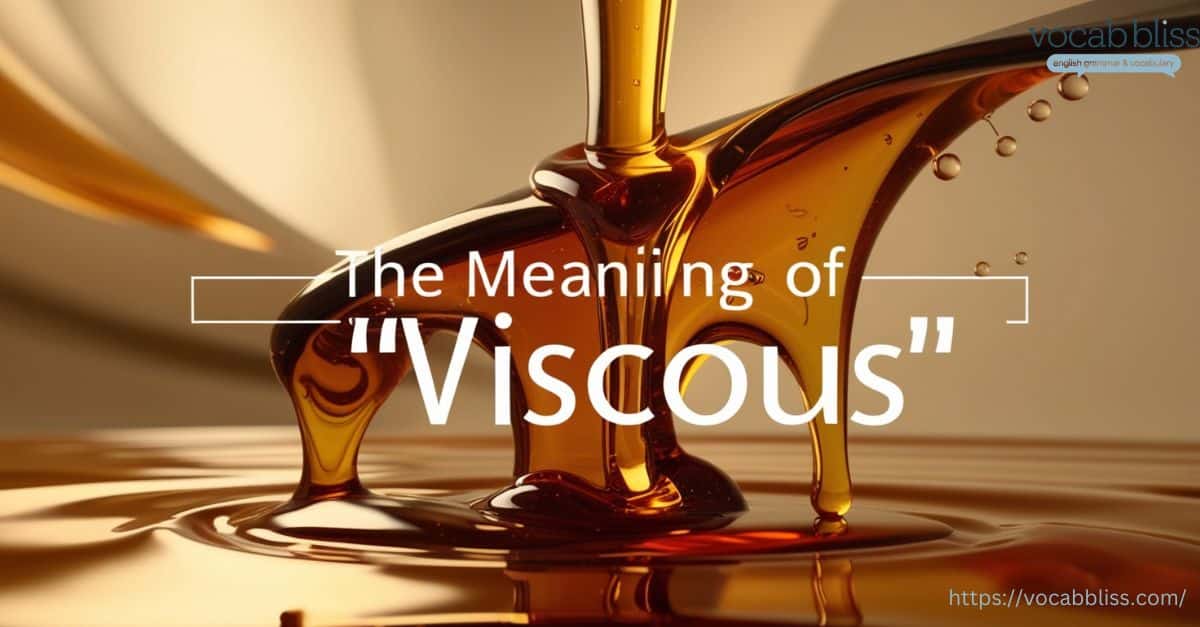When it comes to writing clearly and accurately, word choice is crucial. Sometimes, two words might look similar or even sound alike, yet their meanings are entirely different. A prime example of this confusion is the pair “vicious vs viscous.”
Although these words are often mixed up, understanding their definitions, usage, and origins will help you use them correctly in your writing. In this article, we’ll explore the differences between these two commonly confused terms, give you examples of their proper use, and provide helpful tips to ensure you always choose the right one.
Quick Summary
In summary, vicious vs viscous are two words that often get confused due to their similar sound, but they have entirely different meanings. Vicious refers to aggressive, harmful, or malicious behavior, often with the intent to cause damage or suffering. It is used to describe actions, people, or situations that are cruel or violent. On the other hand, viscous is a term used to describe the physical properties of liquids, particularly those that are thick, sticky, or resistant to flow. It is commonly used to characterize substances like honey, oil, or paint. While these words may sound alike, understanding their distinct definitions and contexts ensures that you use them correctly and avoid common mistakes in writing and speaking.
Discover more: Lead or LEED: When to Use Which One?
Understanding the Confusion Between “vicious vs viscous”
At first glance, the words “vicious vs viscous” might seem almost interchangeable due to their similar spelling and pronunciation. But they couldn’t be more different in meaning. Despite this, many people confuse the two words, especially when speaking or writing quickly. This mix-up often leads to communication errors, making it important to understand the distinctions between them.
Why These Two Words Are Often Confused
The main reason vicious vs viscous are commonly confused is their phonetic similarity. They both start with the same “vi-” sound, and both end with “-ous.” This makes them sound nearly identical when spoken, which is a recipe for misunderstanding, especially for non-native English speakers or those unfamiliar with the terms.
Additionally, both words are adjectives, which contributes to their interchangeable use in some cases. However, while they share grammatical characteristics, they describe completely different concepts. This dual factor of phonetic and grammatical similarity often causes confusion.
Common Mistakes People Make When Using These Terms
Here are some of the most frequent errors people make when mixing up vicious vs viscous:
- Using “Vicious” when describing liquids: Since vicious refers to behavior that is harmful or aggressive, people sometimes mistakenly use it to describe liquids that are thick or sticky. For example, a sentence like “The viscous storm was a danger to the town” should instead use vicious to describe the severity of the storm’s impact.
- Describing a person as “viscous”: A common mistake is calling someone viscous when referring to their unpleasant or aggressive personality. The correct word here is vicious—a vicious person is one who is cruel or malicious, not someone who is physically thick or sticky.
- Using “Viscous” in place of “Vicious” when describing situations or actions: Sometimes, people mistakenly use viscous to describe an aggressive or violent action. For example, “The viscous attack left him injured” should be replaced with vicious since an attack can be harmful or brutal, not sticky or thick.
The Meaning of “Vicious”

The word vicious is used to describe behavior, actions, or events that are violent, malicious, or extreme in nature. It often conveys a sense of aggression, cruelty, or harmful intent. Whether you’re referring to a person, an attack, or a situation, vicious highlights a severe and often destructive quality.
Definition and Key Characteristics of “Vicious”
- Vicious describes something or someone that exhibits cruelty, malice, or violence. It can refer to both physical actions (like an attack) and abstract qualities (such as a vicious cycle of harmful behaviors).
- The term carries a strong negative connotation, suggesting harm or danger, often with intent to cause pain or damage.
Here are some examples of how vicious is used in context:
- A vicious dog: A dog that is aggressively harmful, often attacking or threatening others.
- A vicious rumor: A rumor spread with the intent to harm someone’s reputation, often malicious and untrue.
- A vicious cycle: A harmful, self-perpetuating pattern of behavior or events that seem impossible to escape.
In these examples, vicious describes actions or qualities that are not just harmful but are actively harmful with intent or force. Whether it’s the viciousness of a person’s behavior or the severity of a situation, the word signals danger, cruelty, or extreme harshness.
How do you Spell Vicious Correctly
The spelling of vicious can sometimes trip people up due to its similar appearance to other words, such as viscous. Here are some helpful tips to ensure you’re spelling vicious correctly:
- Remember the double “c”: The correct spelling is v-i-c-c-i-o-u-s. A good way to remember this is by linking it to the idea of “cruelty” or “violence”, both of which have a strong association with the harshness conveyed by the word vicious. The double “c” can remind you of the severity or double impact that vicious actions or qualities have.
- Avoid mixing it up with “viscous”: Many people confuse vicious with viscous because of their similar endings, but they are entirely different words with distinct meanings. Viscous refers to something thick or sticky, often used for liquids, while vicious relates to aggression or cruelty.
Common Misspellings and How to Avoid Them
- Viscous instead of vicious: As mentioned, this is the most common mix-up. If you’re writing about someone’s violent behavior or a harmful situation, remember the word vicious has two “c’s” and no “s”. Think about the association with violence and remember the double “c” in vicious.
- Vicius: This is another common misspelling. The missing “c” can be easily avoided if you keep in mind the relationship between vicious and violence, as both words share the double “c.”
The Meaning of “Viscous”

Unlike vicious, which refers to aggressive or harmful behavior, viscous is a term used to describe the physical properties of a liquid. When something is viscous, it is thick, sticky, or resistant to flow. This term is commonly used in science, engineering, and daily life to describe substances that are slow-moving due to their dense or sticky consistency.
Definition and Key Characteristics of “Viscous”
- Viscous refers to liquids that have a high resistance to flow due to their thickness or stickiness. The higher the viscosity, the thicker and slower the liquid moves. This property can be observed in substances like oils, syrups, or certain paints.
- Viscosity is a measure of a liquid’s internal friction. It determines how easily the liquid can pour or flow. For instance, water has low viscosity, while honey or molasses has high viscosity.
Here are a few examples of viscous substances in context:
- Honey is viscous: Honey has a thick, sticky consistency that makes it slow to pour.
- Viscous oil: Motor oil is often described as viscous because it’s thick and resists flowing, which helps it lubricate engine parts.
- Viscous paint: Certain paints, like those used for thick coatings, are viscous, making them slow to drip or run.
In these cases, viscous is used to describe liquids that move slowly because of their thick, sticky nature, which makes them resistant to flow.
How to Spell “Viscous” Correctly
The correct spelling of viscous can sometimes cause confusion, especially because it sounds similar to vicious, but they have entirely different meanings. Here are some tips for spelling viscous correctly:
- Focus on the “s”: Remember that viscous has a single “s” in the middle, unlike vicious, which has a double “c”. To reinforce the correct spelling, you can associate viscous with the idea of “sticky” or “smooth-flowing” liquids. The “s” in viscous is like the smooth flow of thick liquids that resist movement.
- Use the “c” sound to guide you: Think about the word “stick”, which has a “c” in it. This can remind you that viscous has the same “c” sound that’s associated with sticky or thick substances.
Common Misspellings and How to Avoid Them
- Vicious instead of viscous: This is the most frequent error people make, given how similar the two words sound. To avoid this, remember that viscous refers to liquids and substances that are thick and sticky. If you’re describing a liquid, always use viscous and not vicious.
- Viscous spelled as Viscious: While this isn’t as common, it’s still a potential misspelling. The mistake here is adding an extra “i” before the “o”. To remember the correct spelling, think of it as a “viscous liquid”, not “viscious”.
To avoid confusion, always check the context. If you’re discussing a physical property of a substance—such as its thickness or stickiness—the correct word is viscous. If you’re talking about behavior or cruelty, vicious is the appropriate choice.
Key Differences Between “vicious vs viscous”
While viscous vs vicious share some phonetic similarities, their meanings and usage differ significantly. Understanding the core distinctions between these two words will help ensure that you use them correctly in both written and spoken contexts.
Comparing the Core Differences
At their core, viscous vs vicious serve very different purposes in language. Vicious refers to behavior, actions, or qualities that are harmful, aggressive, or malicious, while viscous is used to describe the physical characteristics of liquids, specifically their thickness or stickiness.
- Vicious relates to behavior or actions that are harmful, violent, or cruel. It’s often used to describe people, actions, or things that cause harm with a sense of intent. For example, a vicious dog is one that is likely to bite or attack.
- Viscous refers to physical properties of liquids, describing how thick, sticky, or resistant to flow a liquid is. For instance, honey is viscous because it flows slowly due to its thick consistency.
These differences highlight the conceptual distinction between them: vicious applies to human or animal actions, while viscous is used exclusively to describe substances or materials, particularly liquids.
How They Relate to Different Senses
- Vicious involves the behavioral or emotional sense, often implying cruelty or aggression. It’s a term frequently used in discussions of dangerous actions or harmful intent, whether in reference to a person, an attack, or even a situation.
- Viscous, on the other hand, is firmly grounded in the physical sense, particularly in scientific or everyday contexts. It is used to describe how a liquid behaves or flows based on its internal resistance, such as thick oils, syrups, or even lava.
Here’s a breakdown to clarify the viscous vs vicious:
| Word | Meaning | Common Contexts |
|---|---|---|
| Vicious | Cruel, aggressive, or violent in nature | Describing behavior or actions (e.g., a vicious attack) |
| Viscous | Thick, sticky, resistant to flow (liquids) | Describing liquids or substances (e.g., viscous honey) |
Common Confusion Scenarios
Given their phonetic similarity, people often confuse vicious vs viscous when speaking or writing quickly. Here are some common scenarios where these words are mistakenly swapped:
- Incorrect: “The vicious syrup was hard to pour.” Correct: “The viscous syrup was hard to pour.”
- Explanation: Syrup is viscous because it’s thick and sticky. Describing it as vicious would be incorrect, as vicious describes behavior, not physical properties.
- Incorrect: “She was attacked by a viscous dog.” Correct: “She was attacked by a vicious dog.”
- Explanation: A dog that attacks or behaves aggressively is described as vicious, not viscous. The word vicious relates to aggression or cruelty, which is more appropriate for this context.
- Incorrect: “The storm’s winds were viscous and powerful.” Correct: “The storm’s winds were vicious and powerful.”
- Explanation: The storm’s winds were destructive and aggressive, making vicious the correct choice here. Viscous would refer to something sticky or slow-moving, which doesn’t apply to wind.
- Incorrect: “The vicious paint covered the walls in a thick layer.” Correct: “The viscous paint covered the walls in a thick layer.”
- Explanation: Paint that is thick and difficult to spread is viscous, not vicious. In this case, you’re describing a physical property of the paint.
By being mindful of these common confusion scenarios, you can improve your writing and avoid errors that may confuse your readers. Keep in mind that vicious refers to harmful behavior or aggression, while viscous describes the physical nature of liquids.
Examples of Correct Usage in Context
Correct Usage of “Vicious”
- The vicious storm left widespread destruction in its wake.
- She launched a vicious attack on her opponent during the debate.
- The vicious rumors spread quickly through the office.
Correct Usage of “Viscous”
- The viscous syrup was hard to pour from the bottle.
- The viscous fluid needed to be heated before it could flow.
- When mixing the ingredients, make sure the batter has a viscous consistency.
Synonyms of “viscous vs vicious”
Using synonyms can enrich your writing and prevent repetition. Here are some useful synonyms for both vicious vs viscous:
Synonyms of “Vicious”
- Cruel
- Malicious
- Savage
- Brutal
- Aggressive
- Hostile
- Ferocious
Each of these words can be used in place of vicious depending on the context. For example, instead of saying “a vicious attack,” you might say “a brutal attack” or “a cruel attack.”
Synonyms of “Viscous”
- Sticky
- Thick
- Syrupy
- Gluey
- Gooey
- Molasses-like
Using synonyms can make your writing sound more dynamic and varied. For example, instead of saying “viscous liquid,” you might say “sticky liquid” or “thick liquid.”
Origins of “vicious vs viscous”

The etymology of both vicious vs viscous provides insight into how their meanings developed.
The Etymology of “Vicious”
The word vicious comes from the Latin “vitiosus”, meaning full of faults or defects. Over time, its meaning expanded to describe behavior that was morally flawed, harmful, or violent. The word retained this meaning as it entered the English language, becoming associated with cruelty, malice, and violence.
The Etymology of “Viscous”
Viscous comes from the Latin word “viscosus”, which means sticky or adhesive. This word was used to describe substances that had a thick, glutinous texture. As viscous entered the English language, it became primarily associated with liquids that are slow-flowing due to their thickness.
Tips for Avoiding Common Mistakes
To ensure you are using viscus vs viscous correctly, consider these helpful tips:
- Sound Check: While they may sound alike, remember that vicious refers to behavior or actions, while viscous relates to liquids. If you’re talking about something being cruel or violent, vicious is your word. If you’re describing something thick or sticky, viscous is the right choice.
- Context is Key: Pay attention to the context of your writing. If you’re describing a physical property, it’s likely viscous. If you’re discussing someone’s behavior or a dangerous situation, you’ll probably need vicious.
- Double-Check Spelling: If you’re unsure of the spelling, remember that vicious has double “c” and viscous has an “s” in the middle. Associating these words with their meanings can help you remember.
Conclusion
In conclusion, understanding the difference between vicious vs viscous is essential for clear, effective writing. Although these words sound similar, they describe very different things: vicious refers to aggressive or harmful behavior, while viscous describes the thick, sticky nature of certain liquids. By keeping their meanings, usage, and spelling in mind, you’ll be able to use these terms correctly and avoid common mistakes. Always remember to check the context and be mindful of which quality you’re describing—whether it’s a vicious attack or a viscous liquid!
Expand Your Knowledge:
- Inter vs Intra: Decoding the Differences
- Is it Rational vs Rationale? Decoding the Difference
- Constant vs Consistent: A Deep Dive into Their Meanings
- Flavour or Flavor: Understanding the Correct Usage







